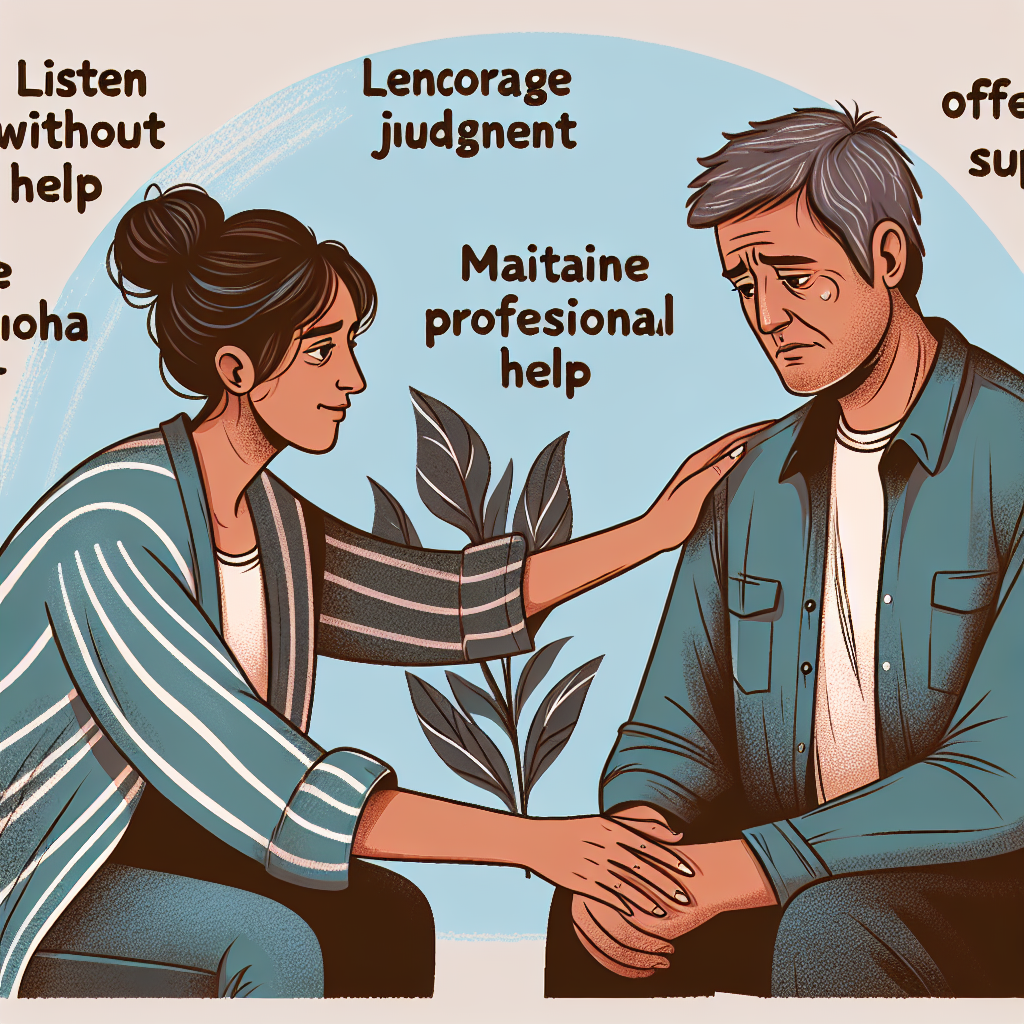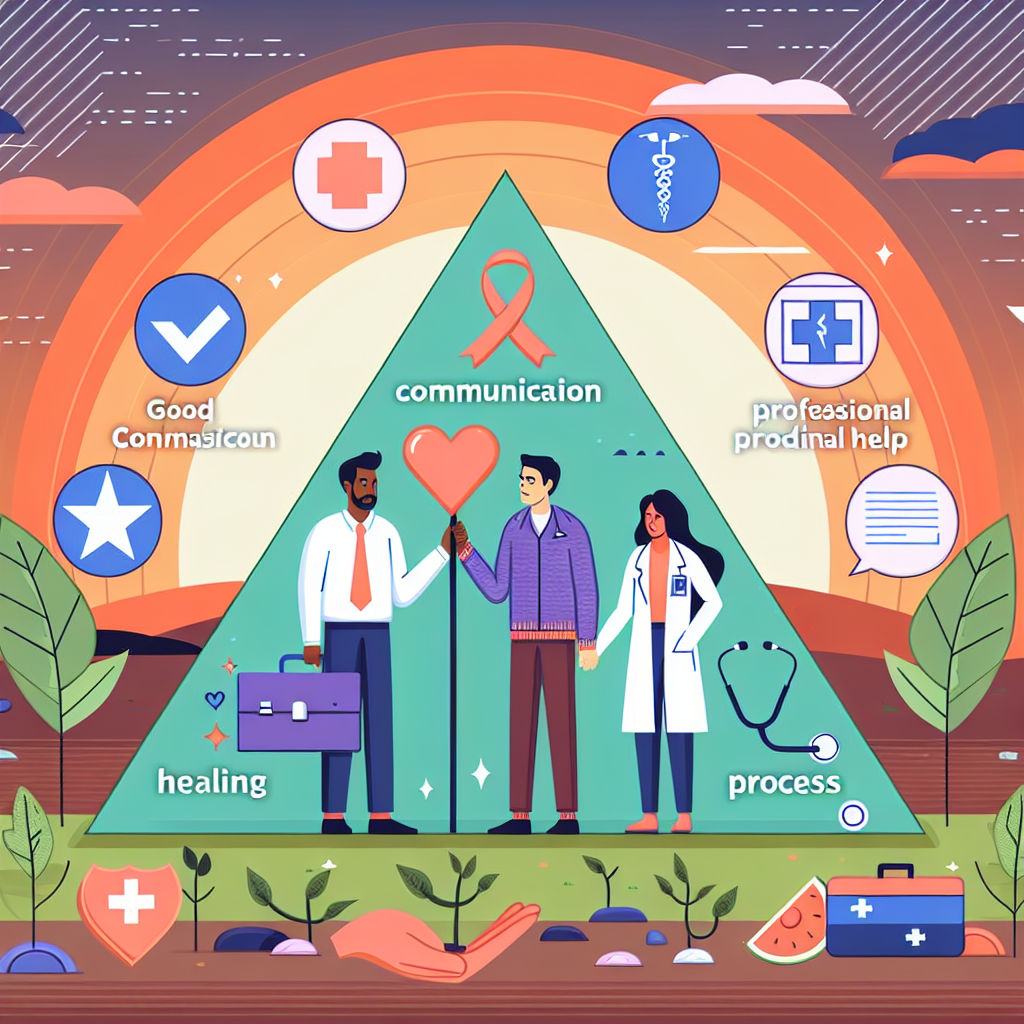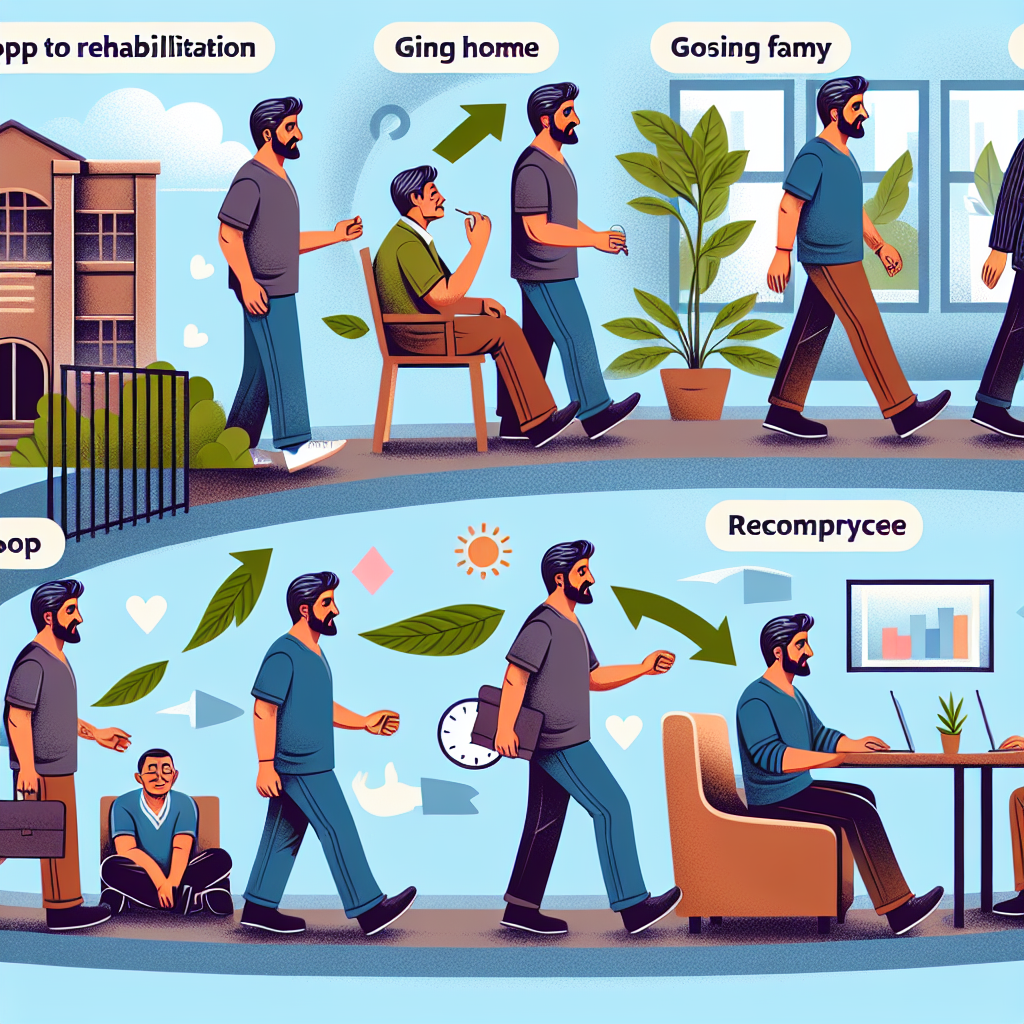-
Table of Contents
“Empower, Support, Heal: Practical Steps for Helping a Loved One Overcome LSD Addiction”
Introduction

Supporting a loved one with LSD addiction can be a challenging and emotional journey, but it is crucial for their recovery and well-being. Practical tips for providing effective support include educating yourself about LSD and its effects, fostering open and non-judgmental communication, encouraging professional treatment, and creating a supportive environment. Additionally, setting healthy boundaries, practicing self-care, and seeking support for yourself are essential components of the process. By understanding the complexities of addiction and implementing these strategies, you can play a vital role in helping your loved one navigate their path to recovery.
Understanding LSD Addiction: Key Facts and Myths
LSD, or lysergic acid diethylamide, is a powerful hallucinogenic drug that has been both romanticized and demonized in popular culture. Understanding LSD addiction requires separating fact from fiction, as myths can often cloud our judgment and hinder effective support for those struggling with this condition. One common misconception is that LSD is not addictive because it does not produce the same physical dependency as substances like opioids or alcohol. However, psychological dependence can be just as debilitating, leading individuals to repeatedly seek out the drug despite negative consequences.
Another myth is that LSD use is always a gateway to more dangerous drugs. While it is true that some individuals may experiment with other substances, this is not a universal outcome. Each person’s experience with LSD is unique, influenced by a variety of factors including their mental health, environment, and personal history. Recognizing this individuality is crucial when offering support, as it allows for a more compassionate and tailored approach.
It is also important to understand the nature of LSD’s effects. The drug can cause intense visual and auditory hallucinations, altered perceptions of time and space, and profound changes in thought processes. These experiences can be both exhilarating and terrifying, sometimes leading to “bad trips” that can have lasting psychological impacts. Knowing this can help you empathize with your loved one’s struggles and provide the emotional support they need.
One of the key facts about LSD is that it can exacerbate underlying mental health issues. For individuals with conditions such as anxiety, depression, or schizophrenia, LSD use can trigger or worsen symptoms. This underscores the importance of a holistic approach to treatment, one that addresses both the addiction and any co-occurring mental health disorders. Encouraging your loved one to seek professional help is a vital step in this process. Therapists and counselors who specialize in addiction can offer strategies and coping mechanisms that are specifically designed to deal with the unique challenges posed by LSD.
Another critical aspect of supporting a loved one with LSD addiction is creating a safe and non-judgmental environment. Stigma and shame can be significant barriers to seeking help, so it is essential to approach the situation with empathy and understanding. Open, honest communication can go a long way in building trust and encouraging your loved one to share their experiences and feelings. This can also help you better understand their triggers and the underlying reasons for their drug use, which is crucial for effective support.
Education is another powerful tool in your arsenal. By learning more about LSD and its effects, you can dispel myths and provide accurate information that can help your loved one make informed decisions about their health. This knowledge can also empower you to advocate for them in medical or therapeutic settings, ensuring they receive the comprehensive care they need.
Lastly, self-care is an often-overlooked but essential component of supporting someone with an addiction. The emotional toll can be significant, and it is important to take care of your own mental and physical well-being. This not only ensures that you are in the best position to offer support but also sets a positive example for your loved one.
In conclusion, understanding LSD addiction involves debunking myths and focusing on the facts. By approaching the situation with empathy, open communication, and a commitment to education, you can provide meaningful support to your loved one on their journey to recovery.
Effective Communication Strategies for Supporting a Loved One with LSD Addiction
Supporting a loved one with LSD addiction can be a challenging and emotional journey, but effective communication strategies can make a significant difference in their recovery process. One of the most crucial aspects of this support is fostering an environment of trust and understanding. Begin by educating yourself about LSD and its effects. This knowledge will not only help you understand what your loved one is going through but also enable you to communicate more effectively and empathetically.
When initiating conversations, choose a calm and private setting where both of you can speak openly without distractions. It’s essential to approach these discussions with a non-judgmental attitude. Express your concerns using “I” statements, such as “I feel worried when I see you struggling,” rather than accusatory “you” statements like “You need to stop using LSD.” This approach reduces defensiveness and opens the door for honest dialogue.
Listening is just as important as speaking. Practice active listening by giving your full attention, maintaining eye contact, and nodding to show understanding. Reflect back what you’ve heard by summarizing their points, which demonstrates that you are genuinely engaged in the conversation. For instance, you might say, “It sounds like you’re feeling overwhelmed and using LSD to cope.” This validation can be incredibly comforting and can encourage your loved one to share more about their experiences and struggles.
In addition to listening, asking open-ended questions can facilitate deeper conversations. Questions like “What do you think triggers your desire to use LSD?” or “How do you feel after using it?” can help your loved one explore their addiction more thoroughly. These questions show that you are interested in their perspective and are not merely seeking to impose your own views.
While it’s important to be supportive, setting boundaries is equally crucial. Clearly communicate what behaviors are unacceptable and what the consequences will be if those boundaries are crossed. For example, you might say, “I can’t support you financially if you continue to use LSD.” Setting these limits helps protect your well-being and can also motivate your loved one to seek help.
Encouraging professional help is another vital step. Gently suggest that they speak with a therapist or join a support group. Offer to help them find resources or even accompany them to appointments if they feel anxious about going alone. Reinforce the idea that seeking help is a sign of strength, not weakness.
Throughout this process, it’s essential to take care of yourself. Supporting someone with an addiction can be draining, and neglecting your own needs can lead to burnout. Make sure to engage in activities that bring you joy and relaxation, and consider seeking support for yourself, whether through therapy or support groups for families of addicts.
Celebrate small victories along the way. Recovery is a long and often arduous journey, and acknowledging progress, no matter how minor, can boost your loved one’s morale. Simple affirmations like “I’m proud of you for seeking help” or “I can see how hard you’re working” can provide much-needed encouragement.
In conclusion, effective communication strategies are fundamental in supporting a loved one with LSD addiction. By educating yourself, practicing active listening, asking open-ended questions, setting boundaries, encouraging professional help, and taking care of your own well-being, you can create a supportive environment that fosters recovery and healing. Remember, your compassion and understanding can be powerful tools in helping your loved one navigate their path to sobriety.
Creating a Safe and Supportive Environment for Recovery
Creating a safe and supportive environment for a loved one struggling with LSD addiction is crucial for their recovery journey. The first step in fostering such an environment is to educate yourself about LSD and its effects. Understanding the nature of the addiction, the psychological and physical impacts, and the potential challenges your loved one may face can help you approach the situation with empathy and knowledge. This foundation of understanding allows you to offer informed support and reduces the likelihood of misunderstandings or judgments that could hinder their progress.
Communication is another vital component in creating a supportive environment. Open, honest, and non-judgmental conversations can help your loved one feel heard and understood. It’s important to listen actively, showing that you genuinely care about their feelings and experiences. Avoiding blame and criticism can create a safe space where they feel comfortable sharing their struggles and seeking help. Encouraging them to express their thoughts and emotions can also provide valuable insights into their needs and how best to support them.
Establishing a stable and predictable routine can significantly benefit someone recovering from LSD addiction. Consistency in daily activities, such as regular meal times, sleep schedules, and exercise, can provide a sense of normalcy and structure. This stability can help reduce anxiety and stress, which are often triggers for substance use. Additionally, engaging in healthy activities together, such as cooking nutritious meals, going for walks, or practicing mindfulness exercises, can strengthen your bond and promote a healthier lifestyle.
Creating a drug-free environment is essential for supporting recovery. Removing any substances or paraphernalia from the home can reduce temptation and prevent relapse. It’s also important to be mindful of the media and social influences that may glorify or trivialize drug use. Encouraging positive influences, such as supportive friends and family members, can help reinforce the commitment to sobriety. Surrounding your loved one with people who understand and respect their journey can provide a network of encouragement and accountability.
Professional help is often necessary for overcoming addiction, and supporting your loved one in seeking treatment is crucial. Researching and recommending reputable treatment options, such as therapy, counseling, or rehabilitation programs, can provide them with the tools and resources needed for recovery. Offering to accompany them to appointments or support groups can also demonstrate your commitment to their well-being. It’s important to respect their autonomy and allow them to make their own decisions about treatment while providing encouragement and support.
Patience and perseverance are key when supporting someone with LSD addiction. Recovery is a long and often challenging process, with potential setbacks along the way. It’s important to remain patient and understanding, offering consistent support even during difficult times. Celebrating small victories and progress can help maintain motivation and reinforce the positive changes they are making. Remember that your unwavering support can be a powerful source of strength and inspiration for your loved one.
In conclusion, creating a safe and supportive environment for a loved one recovering from LSD addiction involves education, open communication, stability, a drug-free space, professional help, and patience. By fostering an atmosphere of understanding, encouragement, and consistency, you can play a pivotal role in their journey towards recovery. Your support can make a significant difference, providing the foundation they need to overcome addiction and build a healthier, more fulfilling life.
Encouraging Professional Help: How to Find the Right Treatment for LSD Addiction
Supporting a loved one with LSD addiction can be a challenging and emotional journey, but encouraging professional help is a crucial step towards recovery. Finding the right treatment for LSD addiction involves understanding the available options and guiding your loved one towards the most suitable path. The process begins with recognizing the importance of professional intervention, as addiction is a complex condition that often requires specialized care. By fostering an environment of empathy and support, you can help your loved one feel more comfortable seeking the help they need.
One of the first steps in encouraging professional help is to educate yourself about LSD addiction and its effects. Understanding the psychological and physical impacts of LSD can provide you with the knowledge needed to have informed conversations with your loved one. This awareness can also help you identify the signs of addiction and the potential risks associated with continued use. By demonstrating your commitment to understanding their struggle, you can build trust and show that you are genuinely invested in their well-being.
When discussing treatment options, it is essential to approach the conversation with compassion and without judgment. Express your concerns in a non-confrontational manner, emphasizing that seeking professional help is a sign of strength, not weakness. Highlight the benefits of treatment, such as improved mental health, better relationships, and a more fulfilling life. It is also helpful to remind your loved one that addiction is a medical condition, and just like any other health issue, it requires appropriate care and attention.
Finding the right treatment program involves researching various options and considering factors such as the severity of the addiction, the presence of co-occurring mental health disorders, and personal preferences. There are several types of treatment programs available, including inpatient rehabilitation, outpatient programs, and therapy sessions. Inpatient rehabilitation provides a structured environment with 24/7 support, making it an ideal choice for those with severe addiction. Outpatient programs offer more flexibility, allowing individuals to continue with their daily responsibilities while receiving treatment. Therapy sessions, such as cognitive-behavioral therapy (CBT) and group therapy, can be beneficial in addressing the underlying causes of addiction and developing coping strategies.
To find the right treatment program, consider seeking recommendations from healthcare professionals, such as doctors or therapists, who have experience with addiction treatment. They can provide valuable insights and refer you to reputable facilities. Additionally, online resources and support groups can offer information and personal experiences that may help in making an informed decision. It is also important to involve your loved one in the decision-making process, as their input and comfort with the chosen program are crucial for successful recovery.
Once a treatment program is selected, continue to offer your support and encouragement throughout the recovery journey. Attend family therapy sessions if available, and educate yourself on how to create a supportive home environment. Recovery is a long-term process, and your ongoing involvement can make a significant difference in your loved one’s progress. Celebrate their achievements, no matter how small, and remind them that setbacks are a natural part of recovery.
In conclusion, encouraging professional help for a loved one with LSD addiction requires patience, understanding, and a proactive approach. By educating yourself, approaching the conversation with empathy, researching treatment options, and providing continuous support, you can play a vital role in their journey towards recovery. Remember, the path to overcoming addiction is not a solitary one, and your unwavering support can be a beacon of hope and strength for your loved one.
Q&A
1. **Question:** What is a crucial first step in supporting a loved one with LSD addiction?
**Answer:** Educate yourself about LSD addiction to understand its effects and challenges.
2. **Question:** How can you encourage a loved one with LSD addiction to seek professional help?
**Answer:** Gently suggest therapy or counseling and offer to help them find a suitable professional.
3. **Question:** What is an important aspect of communication when talking to a loved one about their LSD addiction?
**Answer:** Use non-judgmental and empathetic language to create a supportive environment.
4. **Question:** How can you help maintain a safe environment for a loved one struggling with LSD addiction?
**Answer:** Remove any substances from the home and encourage healthy, drug-free activities.
Conclusion
Supporting a loved one with LSD addiction requires a multifaceted approach that includes education, empathy, and professional intervention. Educating oneself about LSD and its effects can help in understanding the challenges faced by the addicted individual. Demonstrating empathy and maintaining open, non-judgmental communication can foster trust and encourage the person to seek help. Encouraging professional treatment, such as therapy or rehabilitation programs, is crucial for effective recovery. Additionally, setting healthy boundaries and seeking support for oneself can ensure that the support provided is sustainable and effective. Overall, a combination of informed support, professional help, and self-care forms the foundation for assisting a loved one struggling with LSD addiction.



